Monday, September 12, 2005
Thursday, September 8: Biloxi, DeDeaux
Kim Kwiatec, MD is the medical director, and Brian Kurtz, RN is the manager. We talked for a while about the training they had done, including the drills at the NYC GOP convention and the Atlanta Olympics at which they had medical aid stations. Most important, I heard that they had been called up by FEMA and prepositioned in Memphis, Tennessee prior to Katrina’s landfall. They arrived in Biloxi on Wednesday, two days after the storm. For this team, that volunteers and prepares precisely for this kind of event, things went quite smoothly. They have a large team of doctors, nurses, and paramedics, complete with all the supplies they need plus supplies to provide to others. Very professiona
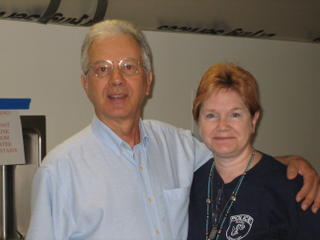 l.
l. Another team from Ohio also came down. These folks were from the Ohio Military Reserve, a state guard unit (as opposed to the National Guard, the state guard can’t be federalized). I first met Halita Holmes, a sweet, gentle massage therapist--she serves by giving massages to disaster relief workers, keeping their bodies and spirits going. My ears perked up when she told me she had joined this guard unit, and was working on qualifying on the M-16! This unit has regular military basic training, command structure, and ranks. Most of the members are retired military. Private Halita told me a story of having been ‘out in the field’ with their trucks, serving people not coming in to the hospital. I asked her if there was a chance of my going out with them. It sounded slightly more interesting than looking at rashes and refilling medications. She called the team commander, Major Fred Miller on their radio. They had already left, but came back to get me. They had trucks (Chevy Suburbans) loaded with MRE’s, water, other essentials, and tetanus vaccine. Their nurse was Capt. Karen Thomas, and they were very happy to have a ‘doc’ coming along.
We first drove west on I-10 from Biloxi, going north of I-10 about 14 miles west of Biloxi; out to a small rural community called Vidalia, which they described by asking me: “Have you seen the movie ‘Deliverance’?” There’s a fellow there, Kenny, who needs some medications. He has congestive heart failure, but is pretty healthy—he does all the work, a couple of young sons seem to be layabouts. Dental care in rural Mississippi is not all it could be; my team told me the whole family’s tooth count might amount to one whole set of teeth. OK, so it’s an exaggeration. Whatever the team was thinking, they provided for Kenny’s needs very professionally.
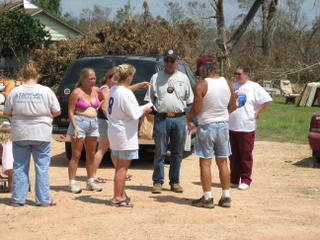 We also met a neighbor—well, she met us, driving up in her truck when we came on Kenny’s property, to make sure we weren’t there to loot. She was retired USAF, so got along well with our paramilitary team.
We also met a neighbor—well, she met us, driving up in her truck when we came on Kenny’s property, to make sure we weren’t there to loot. She was retired USAF, so got along well with our paramilitary team. We next went back toward the interstate, to a mobile home community where we were told some people had medical needs. Most folks were OK, we delivered a few medications and some water. One woman with ‘medical needs’ is a retired RN with CHF (congestive heart failure)—but she fixes meals for 25 people in her neighborhood where the power is out and regular stoves not working. Their biggest problem is inadequate sleep, due to looters who come at night to siphon gas out of cars and try to break in to houses.
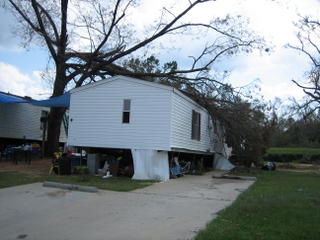 They have a neighborhood armed patrol, and the requisite “You loot, we shoot” sign in the front gate. Here you see one of the mobile homes with some new accessories: a fallen tree limb, and a tarp to cover the new common cooking area.
They have a neighborhood armed patrol, and the requisite “You loot, we shoot” sign in the front gate. Here you see one of the mobile homes with some new accessories: a fallen tree limb, and a tarp to cover the new common cooking area.Next stop: Old DeDeaux (pronounced here DEE-doe) School, where the DeDeaux community had set up a distribution point and medical aid station in the old school.
This was quite impressive. They had massive piles of water, food, and clothes, mostly brought by the army or FEMA trucks, with some ice brought in by helicopter to get it out before it melted. They have so much stuff, they’ll need a relief effort to help them recover from the relief effort.
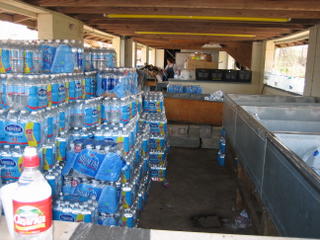
A local RN, Mark Irby, who works in the BRMC ED (Emergency Department), together with Tammy, a CNA (Certified Nurse Assistant) had—with the Sheriff’s permission—raided a pharmacy and commandeered various medications and medical supplies for their aid station. Mark was bringing tetanus vaccine from the hospital for the local folks. They had a very good assortment of common medications. We surveyed what they had, and I made a list of some other drugs they might need. We stayed a few hours, with our nurse, Karen, giving tetanus shots and dressing wounds, while I dispensed drugs if we had them, wrote prescription refills, and saw patients.
Impressed by the DeDeaux folks’ initiative in serving their community, I agreed to return the next day.
 After finishing at DeDeaux School, we drove back to Biloxi, where the Ohio team took me to a neighborhood that had been hit directly by the 32 foot flood surge that hit central Biloxi. Here virtually all the buildings are either totally demolished, damaged irreparably, or uninhabitable.
After finishing at DeDeaux School, we drove back to Biloxi, where the Ohio team took me to a neighborhood that had been hit directly by the 32 foot flood surge that hit central Biloxi. Here virtually all the buildings are either totally demolished, damaged irreparably, or uninhabitable.Driving through these streets and seeing the wreckage of this ‘proud old lady’, I was struck that I was unable to respond with as strong an emotion as I felt was appropriate. Perhaps my brain protecting me from the psychological shock if I were to really comprehend it all. I remember seeing on our California TV news before leaving a diagram showing that if this had happened along the California coast, everything from San Francisco to Santa Barbara would be devastated. Truly, truly unbelievable.
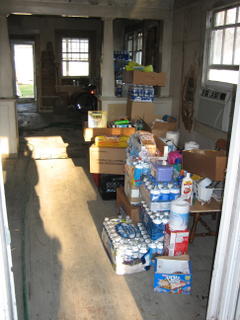 We first stopped at Ellie’s house. Ellie is a retired nurse, I think 71, in good health. Her home, however, as all her neighbors’ homes, is nothing but a shell. Inside, mud has been cleared from the floor, but the sheetrock on the walls is mush, the bathroom fixtures a wreck.
We first stopped at Ellie’s house. Ellie is a retired nurse, I think 71, in good health. Her home, however, as all her neighbors’ homes, is nothing but a shell. Inside, mud has been cleared from the floor, but the sheetrock on the walls is mush, the bathroom fixtures a wreck.She now still lives there, but sleeps in one little area on a cot, walled in by plastic sheeting. And get this—she considers herself blessed, and is worried more about the neighbors. This is not unusual—we heard this over and over. Ellie thanked ME for looking at her house and sharing her story.
Next was Billy’s. Billy is a Vietnamese immigrant, and this is his story, in brief. His father was a general in the South Vietnamese army. At the end of that war, he was therefore put in prison. He escaped; was recaptured and imprisoned again. He escaped yet again, and put to sea in a small boat; the boat was overrun by pirates who raped a woman with him, beat the men, and left them all for dead.
Billy managed to end up at a refugee camp in Thailand where he was asked where he wanted to go. Without hesitation, he said America, because he had known American GIs who were good to his family. One little problem: he spoke no English at all. When he started out, he was paid $5 a week while training to be a welder; he paid $2 for rent, $2 for food, and saved $1. After six months he had saved $20. That $20 was then stolen. Eventually he did well as a welder (you don’t need much English, mainly point to what you want done), and had a nice house, a good car, and a family: a wife, and two children: a six-year old girl and a three-month old baby. The six-year old translates for them, including reading Mom’s medical reports!
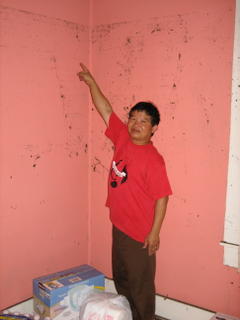 The night Katrina came, Billy took his family into the attic of this one-story home. As the flood waters rose (they eventually reached to 9 feet, just below the ceiling of the first floor), Billy was afraid the whole family would die. So he smashed a hole through the sheetrock, dove down into the water and somehow came up with an ice cooler. He and his wife put blankets in the cooler and set the baby inside. They thought that they would die, but there might be a chance that the baby’s cooler would float and that—like Moses in the bulrushes—the baby would be found and saved.
The night Katrina came, Billy took his family into the attic of this one-story home. As the flood waters rose (they eventually reached to 9 feet, just below the ceiling of the first floor), Billy was afraid the whole family would die. So he smashed a hole through the sheetrock, dove down into the water and somehow came up with an ice cooler. He and his wife put blankets in the cooler and set the baby inside. They thought that they would die, but there might be a chance that the baby’s cooler would float and that—like Moses in the bulrushes—the baby would be found and saved. 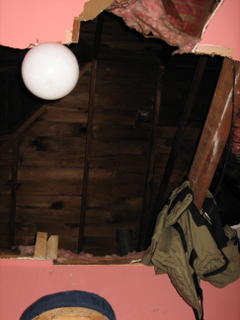 The family didn’t die, but everything they had was destroyed; even the car, which looks pristine but is ruined by the water. Our Ohio military reserve team ‘adopted’ Billy and his family. Instead of just dropping off food and disappearing, they kept coming back to talk, and to attend to the family’s needs.
The family didn’t die, but everything they had was destroyed; even the car, which looks pristine but is ruined by the water. Our Ohio military reserve team ‘adopted’ Billy and his family. Instead of just dropping off food and disappearing, they kept coming back to talk, and to attend to the family’s needs.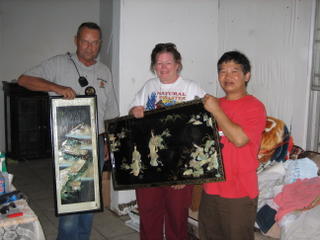 On this, their last trip, Billy had gifts for them. These were beautiful framed bas-relief sculptures of the Great Wall of China, made of mother-of-pearl. They must be the most valuable thing he has left in the world beside his family. He managed to get the photos of his mother and father, but they were damaged by the water—we suggested getting them scanned and restored. These gruff ex-military, ex-marine guys were of course getting close to breaking down with the emotion of the moment, and with Billy’s joy at life despite having yet once more almost lost everything.
On this, their last trip, Billy had gifts for them. These were beautiful framed bas-relief sculptures of the Great Wall of China, made of mother-of-pearl. They must be the most valuable thing he has left in the world beside his family. He managed to get the photos of his mother and father, but they were damaged by the water—we suggested getting them scanned and restored. These gruff ex-military, ex-marine guys were of course getting close to breaking down with the emotion of the moment, and with Billy’s joy at life despite having yet once more almost lost everything. 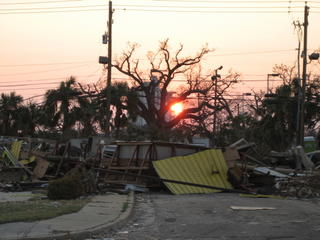
As the sun was setting (the irony of a gorgeous sunset in this once-beautiful, now devastated city is not lost), the team took me down to the waterfront, where we gaped at the huge, hotel-size casino barges that had been thrown up on shore by the raging waters. One collided with the old Tivoli Hotel (which was just being restored after years of neglect), and knocked off a front corner of the Tivoli. Sad to say, this blow was fatal for the old gal.
Only later did I get more of a feeling of the terrible sense of loss suffered, even by those Biloxians who had not lost their homes in the storm. As Anita Tootle (yes, that IS her name, and don’t you dare laugh!) explained to me that night in the hospital: all the landmarks of their memories were gone. The Ring Oak with the trunk grown in a ring, and the legends of the lovers associated with that; the skating rink where she might have had her first kiss; all the sites of her youth were gone. Beauvoir, Jefferson Davis’ home—gone. All the beautiful old Victorian homes here in downtown Biloxi’s historic district (in which the hospital is located)—gone. And, whatever rebuilding is done, these are gone forever.
I walked through Billy’s house and Ellie’s house. Floors are spongy under your feet, so the sub-floors are soaked with water. These homes will have to be demolished. This is the hard part: Ellie’s family had lived in that house, perhaps for generations. The need to hang on to that beautiful past—what Anita called ‘that proud old Southern lady’ wrestles with the urgent need to sweep out the debris and build from scratch, so people can get back to their lives and jobs. Will it ever be the same? Certainly not—not for Anita, not for Ellie, not even for Billy.
But that's not really the story of Biloxi, or the story of this disaster. The real story--one you're almost certainly not seeing on TV, is one of love, community, and defiance.
Now for the end of the day: my new friends from the Ohio Military Reserve Unit took me to the school where the police and firefighters have been eating. I had heard stories of filet mignon and lobster, as they ate the contents of the destroyed casinos' freezers. Well, that was gone: tonight was beans and pork. The team was leaving tomorrow, so I wouldn't get a chance to go out with them again. Halita, networking as ever, came up with a terrific replacement: two firefighters from FDNY, John Seiler and Chris Edwards.
Both are great guys, both r
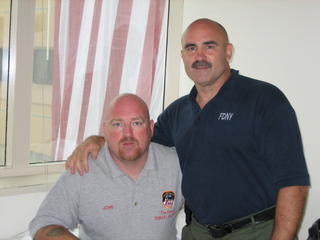 etired, and both permanently affected by the loss of their comrades in 9/11. Although John was retired and Chris on medical disability, they both helped with the recovery of their comrades from the wreckage. Here's a photo of John (on the left) and Chris. We'll see more of them soon.
etired, and both permanently affected by the loss of their comrades in 9/11. Although John was retired and Chris on medical disability, they both helped with the recovery of their comrades from the wreckage. Here's a photo of John (on the left) and Chris. We'll see more of them soon.There's that beautiful big flag in the background. Here are two heroes, coming to 'pay back' for the help the rest of the country sent New York after 9/11. What a country!
Would you consider adding an HTML anchor to Billy's story? I know Billy, he is like my dad, like thousands of immigrants who came with _nothing_ and has made a life for himself.
I think it is important, especially for people in New Orleans, to understand that hard work, dedication, pride, and self-determination are viable alternative to living off a welfare state. I'd like to spread his story far & wide.
BTW, here is a link on how to add an anchor (you'll notice that, appropriately enough, the URL references an anchor, "#idx-link5".)
http://www.w3.org/TR/REC-html40/struct/links.html#idx-link-5
<< Home
